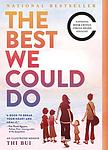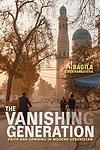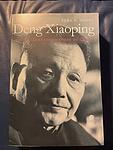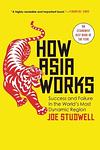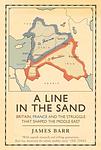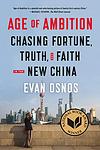The Greatest "Nonfiction, Asian History" Books Since 2010
Click to learn how this list is calculated.
This list represents a comprehensive and trusted collection of the greatest books. Developed through a specialized algorithm, it brings together 288 'best of' book lists to form a definitive guide to the world's most acclaimed books. For those interested in how these books are chosen, additional details can be found on the rankings page.
Genres
Asian History is a category of books that focuses on the historical events, cultures, and societies of Asia. This category includes books that cover a wide range of topics, including the ancient civilizations of China, Japan, and India, the rise and fall of empires, the impact of colonialism, and the modernization of Asian countries. It also includes books that explore the social, political, and economic changes that have shaped the region over time. Overall, Asian History provides readers with a comprehensive understanding of the rich and diverse history of Asia.
Countries
Date Range
Reading Statistics
Click the button below to see how many of these books you've read!
Download
If you're interested in downloading this list as a CSV file for use in a spreadsheet application, you can easily do so by clicking the button below. Please note that to ensure a manageable file size and faster download, the CSV will include details for only the first 500 books.
Download-
1. Sapiens: A Brief History of Humankind by Yuval Noah Harari
This book provides a comprehensive exploration of the history of the human species, tracing back from the earliest forms of Homo Sapiens to the modern day. It delves into evolutionary biology, the development of cultures and societies, and the rise of major ideologies and technologies. The book also discusses the future of the species, posing thought-provoking questions about our roles and responsibilities in a rapidly changing world.
-
2. Behind the Beautiful Forevers: Life, Death, and Hope in a Mumbai Undercity by Katherine Boo
This book is a gripping narrative that provides an in-depth look into the lives of residents in a Mumbai slum, focusing on their struggles and aspirations. The author paints a vivid picture of the harsh realities of poverty, corruption, and inequality, while also highlighting the resilience and hope of the inhabitants. The narrative is a powerful exploration of the complexities of modern India, revealing the stark contrast between the country's booming economy and the grim living conditions of its underprivileged citizens.
-
3. The Best We Could Do: An Illustrated Memoir by Thi Bui
This illustrated memoir captures the story of a Vietnamese family who fled to America after the fall of South Vietnam in the 1970s. The narrative traces their journey and struggles as refugees, while also delving into the family's complex history and relationships. The author uses her own experiences as a new mother to explore themes of parenthood, identity, and the enduring effects of displacement and trauma.
-
4. A History of the World in 100 Objects by Neil MacGregor
This book offers a unique perspective on world history, telling the story of humanity through the examination of 100 man-made objects. The author, a museum director, uses items from the British Museum, ranging from a 2 million-year-old Olduvai stone cutting tool to a contemporary credit card, to explore various themes such as trade, religion, art, science, and politics. The book provides a fascinating lens through which to view the evolution of human civilization.
-
5. Japanese Philosophy by John C. Maraldo, Thomas P. Kasulis, James W. Heisig
This book provides a comprehensive overview of Japanese philosophy, exploring its unique characteristics and its evolution through history. It delves into the diverse intellectual traditions of Japan, including both well-known philosophical schools and lesser-known but equally significant ideas. The text examines how Japanese philosophy has been influenced by and has interacted with other philosophical traditions, particularly Western philosophy, while also highlighting its distinct approach to fundamental philosophical issues such as ethics, aesthetics, and the nature of reality. Through a detailed analysis, the book offers insights into how Japanese philosophical thought has contributed to broader philosophical discourse and how it reflects the cultural and historical context of Japan.
-
6. Empire Of Cotton: A Global History by Sven Beckert
"Empire of Cotton" by Sven Beckert is a comprehensive global history of cotton, exploring its impact on the world economy, politics, and society from the 18th century to the present day. Beckert argues that cotton played a crucial role in the development of capitalism, colonialism, and imperialism, and that its production and trade were intimately linked to the exploitation of labor, the growth of slavery, and the rise of industrialization. The book offers a fascinating and thought-provoking perspective on the complex and often violent history of cotton and its enduring legacy in the modern world.
-
7. The Vanishing Generation: Faith And Uprising In Modern Uzbekistan by Bagila Bukharbayeva
"The Vanishing Generation: Faith And Uprising In Modern Uzbekistan" explores the complex relationship between faith, politics, and social change in contemporary Uzbekistan. Through in-depth interviews and extensive research, the author delves into the lives of young Uzbeks who are navigating the challenges of religious identity, political repression, and the desire for societal transformation. This thought-provoking book sheds light on the struggles and aspirations of a generation caught between tradition and modernity in a rapidly changing society.
-
8. Deng Xiaoping And The Transformation Of China by Ezra F. Vogel
This book provides a comprehensive examination of the life and political career of Deng Xiaoping, a paramount leader who played a crucial role in steering China towards the path of reform and opening-up, transforming it from an impoverished, isolationist country into a global economic powerhouse. Through detailed research and analysis, the narrative delves into Deng's pragmatic approach to governance, his strategies for economic development, and his handling of domestic and international challenges. Highlighting his pivotal policies, leadership style, and the impact of his vision on China's modernization, the book offers an insightful look into the complexities of political leadership and the socio-economic evolution of one of the world's most populous nations.
-
9. How Asia Works by Joe Studwell
This book provides a comprehensive analysis of the economic development in nine Asian countries, focusing on the policies and strategies that have driven their growth. It contrasts successful economies like Japan, South Korea, and China with less successful ones in Southeast Asia, examining land reforms, manufacturing policies, and financial control. The author argues that the successful countries followed a similar developmental path by implementing land reform to support smallholder farming, focusing on manufacturing with strict productivity goals, and controlling the financial sector to support these policies. The book challenges conventional economic theories and offers insights into the mechanisms behind Asia's economic transformations.
-
10. The Great Leveler : Violence And The History Of Inequality From The Stone Age To The Twenty First Century by Walter Scheidel
This book delves into the historical patterns of inequality, arguing that significant reductions in inequality have only ever been brought about by cataclysmic events, which the author terms as the "Four Horsemen": war, revolution, state collapse, and plague. Through a comprehensive examination of societal structures from the Stone Age to the modern era, it presents a compelling case that peaceful reforms have rarely led to lasting decreases in inequality. The work challenges readers to confront the uncomfortable reality that significant improvements in equality have often been forged in the crucible of immense human suffering, thereby questioning the prospects for achieving future equality without such extreme catalysts.
-
11. A Line In The Sand by James Barr
This book delves into the complex history of the modern Middle East, focusing on the post-World War I era when Britain and France drew arbitrary borders, creating new nations and sowing the seeds for future conflicts. It examines the clandestine struggle between these colonial powers as they vied for dominance in the region, often at the expense of the local populations. The narrative reveals how the duplicitous actions and broken promises of Western powers during this period set the stage for enduring turmoil and established a legacy of distrust and instability that continues to affect the geopolitics of the Middle East to this day.
-
12. Empireland by Sathnam Sanghera
The book is a thought-provoking exploration of the British Empire's enduring impact on modern Britain. It delves into the ways in which imperialism has shaped the nation's psyche, politics, economy, and identity, often in ways that are overlooked or forgotten. Through a combination of personal memoir, historical analysis, and contemporary observation, the author challenges readers to confront the legacies of colonialism, including racism and cultural appropriation, and to recognize how the empire's influence permeates various aspects of British life, from its institutions to its global relationships. The work serves as a call to acknowledge and address this complex inheritance in order to better understand present-day Britain.
-
13. Crusade and Jihad: Islam and the Christian World by Bassam Tibi
This book explores the historical, ideological, and political aspects of the Crusades and Jihad, comparing and contrasting the two. It delves into the origins and evolution of the Crusades and Jihad, their impact on Christian and Islamic societies, and their relevance in today's world. The author also examines the role of religion in conflicts and the use of religious ideologies for political purposes, providing a comprehensive understanding of these complex issues.
-
14. Age of Ambition: Chasing Fortune, Truth, and Faith in the New China by Evan Osnos
"Age of Ambition: Chasing Fortune, Truth, and Faith in the New China" is a vivid exploration of contemporary China. The book delves into the lives of everyday citizens, from dissidents to entrepreneurs, and their pursuit of wealth, freedom, and faith amidst the country's rapid modernization. It provides an in-depth look into the country's socio-political landscape, including its struggles with censorship and corruption, as well as the aspirations and challenges faced by its people in the face of change.
-
15. Autumn In The Heavenly Kingdom by Stephen R. Platt
This book provides a detailed historical account of the Taiping Rebellion, one of the most devastating civil wars in history, which took place in 19th-century China. It challenges the conventional Eurocentric perspective by focusing on the dramatic narrative of this conflict and its charismatic leaders, such as Hong Xiuquan, who led a movement to overthrow the Qing dynasty amidst the backdrop of the Opium Wars. The narrative not only explores the massive human cost and the geopolitical stakes but also examines the significant impact of these events on international relations and how they shaped the modern world.
-
16. The Blood Telegram by Gary J. Bass
"The Blood Telegram" is a gripping historical account that explores the devastating 1971 genocide in Bangladesh, then East Pakistan, and the complex political maneuvers during the Cold War era. The book focuses on the moral dilemmas and foreign policy decisions faced by the United States, particularly under the Nixon administration, which, despite receiving detailed reports from its own consul general in Dhaka about the atrocities committed by the Pakistani military, chose to support Pakistan due to its strategic interests. This decision was influenced by the U.S.'s desire to use Pakistan as a conduit for opening relations with China, sidelining the horrific human rights abuses and the desperate pleas for help. The narrative is a powerful indictment of realpolitik and the often catastrophic human cost of geopolitical strategy.
-
17. Maoism by Julia Lovell
"Maoism: A Global History" explores the profound influence of Maoist ideology beyond China, tracing its impact and adaptation in various countries around the world. The book delves into how Mao Zedong's ideas were interpreted and applied in different contexts, from the jungles of Southeast Asia to the urban centers of Europe and America, shaping revolutionary movements and national policies. It examines the allure of Maoism to its international adherents, the resulting political or violent struggles, and its legacy in contemporary politics, offering a comprehensive analysis of how a Chinese revolutionary ideology transformed into a global phenomenon.
-
18. Red Memory by Tania Branigan
"Red Memory" delves into the complex legacy of Mao Zedong's rule in China, exploring how it continues to shape the nation's identity and politics. Through personal stories and interviews, the book uncovers the deep and often conflicting emotions of Chinese citizens who lived through the tumultuous periods of the Great Leap Forward and the Cultural Revolution. The narrative reveals a society grappling with its past, where personal memories of suffering, resilience, and ideological fervor coexist with a state-driven narrative that both reveres and selectively forgets aspects of its own history. This exploration highlights the challenges of reconciling individual trauma with collective memory and the ongoing impact of Mao's era on contemporary China.
-
19. Embers of War: The Fall of an Empire and the Making of America's Vietnam by Fredrik Logevall
"Embers of War: The Fall of an Empire and the Making of America's Vietnam" is a comprehensive examination of the political and military events that led to the Vietnam War. The book explores the collapse of French colonial rule in Vietnam, the rise of the Viet Minh, and the subsequent involvement of the United States. The author critically analyzes the decisions made by key figures and the consequences of these actions, providing a detailed account of the historical events that shaped America's longest war.
Reading Statistics
Click the button below to see how many of these books you've read!
Download
If you're interested in downloading this list as a CSV file for use in a spreadsheet application, you can easily do so by clicking the button below. Please note that to ensure a manageable file size and faster download, the CSV will include details for only the first 500 books.
Download

